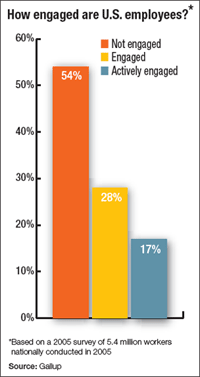It’s no secret that employees fully engaged in a company’s success can be the pivotal factor that propels it to surpass competitors. And in today’s challenging marketplace, the edge that passionate employees bring is more essential than ever. At a time of both rampant commoditization and consumer belt-tightening, employees both willing and able to go that extra mile to exceed customer expectations can make all the difference. But how do companies—particularly multinational enterprises with workforces that span the globe—get employees behind the idea of consistently going above and beyond what’s required to deliver the exceptional?
It’s a challenge that FedEx, which has 258,000 employees and contractors worldwide, faces on a daily basis, Bill Logue, CEO of Memphis-based FedEx Freight, told CEOs gathered for a Chief Executive roundtable discussion on employee engagement held in partnership with FedEx. “Our employees are our brand,” he said. “Every day those employees come across challenges they have to solve on their own. And every decision they make is a reflection on our brand and our company.”

Recognition of the importance of discretionary effort in determining the company’s competitive position has led it to an internal people-service-profit mantra. “If you take care of the people, they’ll take care of the service and they’ll generate a profit,” explains Logue. “You can’t have one without the other.”
FedEx’s commitment to employees involves institutionalizing ways of building employee engagement. Principal among these, says Logue, are efforts to empower employees to be creative about meeting customer needs and to visibly celebrate stellar employees and instances of exemplary service. One recent effort is the company’s “I am FedEx” multimedia campaign, which gives employees a forum for sharing their stories—whether about workplace triumphs or personal passions—but has the side benefit of fostering a community feeling among workers dispersed around the globe. Since it launched in May 2010, FedEx associates have responded enthusiastically, writing and videotaping submissions on everything, from an ability to greet customers in six languages to showcasing a talent for ballroom dancing. Contributions are featured on a “people gallery” at www.IamFedEx.com and on Facebook.
But employees don’t have to toot their own horns at FedEx. There are lots of ways to win corporate recognition, including the Bravo Zulu program (named after the naval signal for “well done”) which allows any FedEx manager impressed by strong performance to bestow recognition on the spot. The award comes with a $100 check, but the true value is in the accolade itself, says Logue. “A year later, that employee won’t be able to tell you what they did with the money, but the letter with the BZ sticker on it will still be up on the wall of their office,” he says. “That’s what they remember.”
Recognition also drives engagement at St. Louis-based Furniture Brands, where employees who generate “big ideas” are eligible for a “Top Drawer” award. CEO Ralph Scozzafava estimates that about 20 are rewarded with a $5,000 Top Drawer award each quarter. “They all go into a pool for one of 10 annual Chairman’s Awards of $10,000,” he says. “But the incentive is more about the recognition than the money—it’s peer pressure and the desire to stand out and make a difference.”
While visibility and incentive initiatives can help encourage workers, a true culture of engagement goes much further—involving a comprehensive program of communicating with and supporting employees to engage them in both day-to-day and big picture challenges. FedEx’s Logue outlined a few essential elements of successful employee engagement.
Take it from the Top. FedEx’s commitment to a people-service-profit- philosophy began with founding CEO Fred Smith, who continues to nurture the philosophy by speaking on current challenges and opportunities in quarterly “From the CEO” broadcasts to employees. The company also puts money behind the mantra by basing a significant amount of managers’ incentive pay on the people side, notes Logue. “It starts at the top and cascades down,” he says.
Dedicate Resources. Building engagement requires time and money. At FedEx, for example, a new EXCEL program brings high-level executives together for a globetrotting “mini-MBA program.” These future leaders take a series of trips to strategic operational centers to learn about different cultures and get a first-hand look at how each operating company works. “Without applying financial resources, you won’t succeed,” notes Logue.
Constant Communication. Aligning far-flung employees around a central core philosophy is no easy feat. At FedEx, communication is a big part of the equation. “When I ran our Express business I had 100,000 employees in more than 1,000 different locations,” says Logue. “But I made sure that I was in front of every member of our management team in all four of our U.S. regions every single quarter. At 5 a.m., 4 a.m., whatever it took, because they see and value and expect that.” After every quarterly earnings conference call, Logue also holds a management team conference call after every quarterly earnings report to make sure that his team understands the company’s perspective on any of the next day’s headlines about FedEx.
Culture and Consistency. Giving employees the tools and resources they need and the incentive to employ them can go a long way, but ultimately instilling a culture of commitment to continual success is at the heart of employee engagement. “If you don’t have a culture, you’d better start creating one,” says Logue.
Participants in the “Lessons from the Engagement Frontlines” CEO2CEO Summit discussion included:
| SID DEBOER is chairman and CEO of Lithia Motors.
DOUGLAS DIRKS is CEO of EMPLOYERS. J.P. DONLON is editor-in-chief of Chief Executive Magazine. CRAIG DUBOW is chairman and CEO of Gannett. PERRY FINE is president of Triangle Services. SUNIL GARGA is CEO of Mphasize LLC. HUGH GRANT is CEO of Monsanto. GERHARD GSCHWANDTNER is CEO of Selling Power. KENNETH HANAU is managing partner of 3i. EMMET KEEFFEE III is CEO and cofounder of iRise. MICHAEL KELLY is president of Michael Kelly Associates. NICHOLAS KONIDARIS is president and CEO of ESI. MARGERY KRAUSK is president and CEO of APCO Worldwide. WILLIAM LOGUE is president and CEO of Fedex Freight. STEPHANIE MARCHESI is managing director of Fleishman-Hillard. KARSTEN MARTENS is president and CEO of Coverdale North America. |
DAVID MARX is president of New World Van Lines.
DREW MORRIS is CEO of Great Numbers! WILLIAM PECOVER is chairman and CEO of Haymarket Media. JEFFREY ROGERS is president and COO of Integra Realty Resources. DENNIS SADLOWSKI is the former CEO of Siemens Energy & Automation. RALPH SCOZZAFAYA is chairman and CEO of Furniture Brands. LARRY SENN is chairman of Senn Delaney. ANAND SHARMA is president and CEO of TBM Consulting. STEVE SHAW is president and CEO of Volt Information Sciences. ROGER SHEDLIN is CEO of OrthoNet. HOWARD STEVENS is CEO of Chally Group Worldwide. JOE TERRY is CEO of Corporate Visions. GEOFF VULETA is CEO of Fahrenheit 212. JOHN R. WATERFIELD is CEO of Affinity Financial. |

Chief Executive Group exists to improve the performance of U.S. CEOs, senior executives and public-company directors, helping you grow your companies, build your communities and strengthen society. Learn more at chiefexecutivegroup.com.
0

1:00 - 5:00 pm
Over 70% of Executives Surveyed Agree: Many Strategic Planning Efforts Lack Systematic Approach Tips for Enhancing Your Strategic Planning Process
Executives expressed frustration with their current strategic planning process. Issues include:
Steve Rutan and Denise Harrison have put together an afternoon workshop that will provide the tools you need to address these concerns. They have worked with hundreds of executives to develop a systematic approach that will enable your team to make better decisions during strategic planning. Steve and Denise will walk you through exercises for prioritizing your lists and steps that will reset and reinvigorate your process. This will be a hands-on workshop that will enable you to think about your business as you use the tools that are being presented. If you are ready for a Strategic Planning tune-up, select this workshop in your registration form. The additional fee of $695 will be added to your total.

2:00 - 5:00 pm
Female leaders face the same issues all leaders do, but they often face additional challenges too. In this peer session, we will facilitate a discussion of best practices and how to overcome common barriers to help women leaders be more effective within and outside their organizations.
Limited space available.

10:30 - 5:00 pm
General’s Retreat at Hermitage Golf Course
Sponsored by UBS
General’s Retreat, built in 1986 with architect Gary Roger Baird, has been voted the “Best Golf Course in Nashville” and is a “must play” when visiting the Nashville, Tennessee area. With the beautiful setting along the Cumberland River, golfers of all capabilities will thoroughly enjoy the golf, scenery and hospitality.
The golf outing fee includes transportation to and from the hotel, greens/cart fees, use of practice facilities, and boxed lunch. The bus will leave the hotel at 10:30 am for a noon shotgun start and return to the hotel after the cocktail reception following the completion of the round.